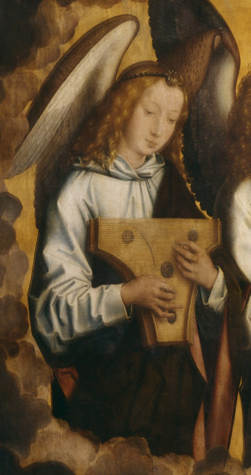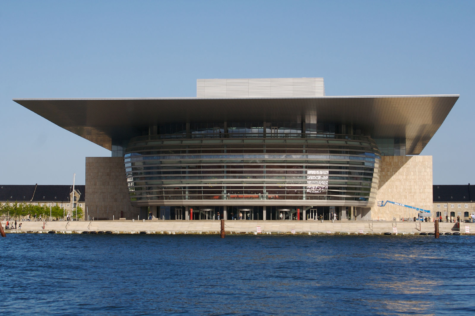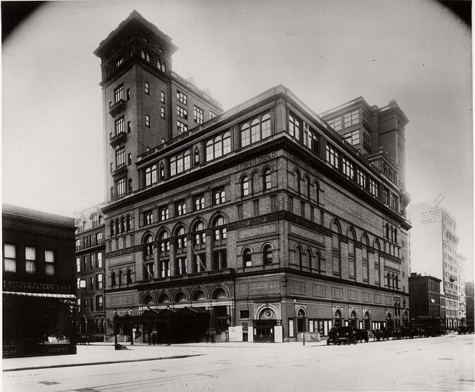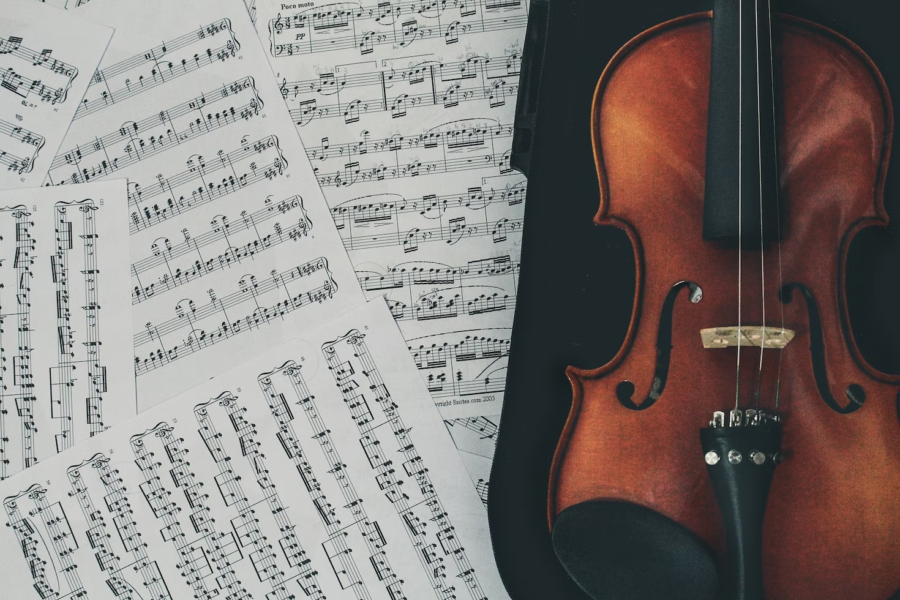Classical Music: A Timeless Treasure or a Dying Art?
Classical music has a long history in touching the souls of listeners. However, has it lost touch with the future?
Classical music is a broad genre that has many historical and distinct characteristics. Understanding the significance of its history helps to reveal the beauty that the genre holds to its listeners.
You are sitting inside a broad, quiet auditorium, surrounded by people who are dressed in formal attire and are talking in hushed tones. The entire audience is buzzing in anticipation of an experience they will never forget. The lights in the auditorium are all dimmed and the center stage is brightly illuminated. The musicians sit idly, waiting for their conductor to start. With just a wave of a hand, a beautiful melody fills the room.
Inside an orchestra concert will guarantee a wonderful performance that almost anyone can enjoy. You can see the flamboyant passion of talented musicians on stage, feel every vibration of the drums, and hear the emotions played through every note. You do not need prior knowledge about orchestral songs nor do you need any connections to classical music in general to enjoy yourself at a performance. The desire to appreciate a beautiful symphony is enough for you to gain a full experience you can’t get anywhere else.
Classical music is a genre that centers around Western European styles and forms, such as symphonies, concerto, and sonata. Typical classical sounds include conventional or strong music which contrasts from the modern styles of jazz, rock, or popular music. The genre has a long history that dates all the way back to the medieval period in Europe. However, the recent lack in classical appreciation insinuates a demanding question: is classical music dying?
History of Classical Music
According to many musicologists, the term “classical music” is a broad term that encompasses specific and distinct periods throughout musical history. The characteristics of each era differ greatly, but still retain the embodiment of orchestral, choral, chamber, and solo pieces.
During the medieval period, which was from 1150 AD to around 1400 AD, the music was considered to be a Gregorian chant – also known as a monophonic chant – sung by Gregorian monks. These chants were simple: uttered in unison and without complex rhythms, all for the act of the Roman Catholic Church. These chants embodied religious practices; they were heard as the “echo” of God’s perfection and emerged as the representation for the divine. During this period, musicians also played sets of instruments which included flutes, lutes, recorders, and string instruments.

The interchange of European ideas and development during the Renaissance allowed for new changes in styles of composition and instrumentals. Polyphonic music, a musical texture utilizing several simultaneous melodies, became prevalent during this time and was beneficial to the Church, helping with church rituals and aid. The Burgundian Netherlands were most influential to classical music; it attracted notable composers such as Guillaume Du Fay (1397–1474), who offered music structured on the Gregorian chants and church-preferred choruses. In particular, string instruments were widely used, including viol, lyre, rebec, psaltery, and guitar. By the 1500’s, classical music had incorporated various musical settings from previous generations and throughout different parts of the continent. Composers explored music through the Italian madrigal, the German tenor lieder, the Spanish villancico, French chanson, and various sacred texts and styles.
The Baroque period introduced an emergence of a complex embrace of tonal and polyphonic music. The instruments used during this era are seen in modern day orchestras: viola, violin, cello, contrabass, bassoon, and oboe. What would be known today as the piano, then, the harpsichord, also began to be used by Baroque composers. Composer Johann Sebastian Bach is widely accepted as the most influential of his time for his role as one of the fathers of Western classical music and as a genius at counterpoint. He blended lines of melodies which incorporated harmony respectively. We can hear his expertise in using counterpoint along with the incorporation of subtle violins in what is arguably his most famous piece, Concerto for Two Violins.
Most people associate classical music with the Classical Period more often than any other era due to the popular composers and pieces prevalent during this time. Within the Classical Period exists a broader scope of numerous symphonies and genres. The sonata form, string quartet, and chamber music were all popularized during the mid 18th century. Additionally, most people recognize Wolfgang Amadeus Mozart as one of the most influential and brilliant composers of classical music. Of course, the excellence of Classical Period composers was not limited to just Mozart. Musical geniuses such as Christoph Willibald Gluck, Joseph Haydn, and Ludwig van Beethoven were prevalent composers alongside Mozart. The composers were able to transform and combine various 18th century and early 19th century textures and formal types into a balanced musical eclecticism. During this era, music was shared to a broader audience; concert halls first opened up and the art and music reflected the innovations and ideas of challenging tradition during the Age of Enlightenment.
As the classical genre developed into the 1900’s as the Romantic era, shifts in instrumentation and usage took place. It was during this time, especially in industrial and western nations, where the production of films and cinema occurred. As a result of the sudden rush for theater building and hosting, directors needed some way to incorporate unique elements into their movies: the solution was classical music.
Classical music played a huge role in the development of drama and theatrical movement. The evocation of emotion, tears, and beauty portrayed in romance movies, comedies, and dramas all utilized the strings of classical music.
Though classical music has been around for centuries, what changed during the modern period?
Classical Music in the 21st Century
According to Gracie Warhust, “Classical music had already been in steady and obvious decline before the pandemic.” As per recent studies, the percentage of attendees of live orchestral concerts and operas also dropped by 30% in recent years. But how could this be? How could a genre with such a rich and intriguing history come to an end just like that? To understand the impending finality of classical music, we need to first take note of the numerous generational factors and modern day ideas.
Firstly, Classical Music has been competing with other genres of music for generations now. With each passing year, more and more soloists and styles are emerging. In a race against artists who put out music quickly to remain relevant and successful, classical musicians cannot simply keep up.
According to the Knight Foundation’s report, “Classical Music Consumer Segmentation Study,” only 10-15% of Americans have a close relationship with classical music. As per their methodology in studying classical music revenue and popularity, their study revealed that a majority of classical music listeners are only “casual” listeners, listeners that only occasionally listen to the genre. According to their study, “Nationally, just 6 percent of the large base of potential classical consumers self-identified as being ‘very knowledgeable’ about classical music.”
A genre that is meant to be shared with a wider audience only touched a small population of adults and older generations. The Knight Foundation reports that even inside the adult range, only a third of classical consumers would go to an orchestra symphony while the rest state that they are only slightly interested or not interested at all.

What caused this drastic disinterest in the classical genre? The answer might seem pretty simple to avid readers, but there are a lot of factors that play a role in the younger generation’s knowledge of orchestral music. For instance, the pushing of classical music in education impacts the perception and enjoyment of classical music on students. When children in elementary school are forced to play the recorder, they are more likely to grow up dislike the playing of music. This is because whenever they hear the term “classical music,” they typically associate it with work or school rather than leisure, thereby lowering their enjoyment of the genre. People who continue on to become musicians later on in their high school or college years were most likely those who started off ahead of their peers in musical experience.
According to Eunice Cho’s blog, “Perspective: The Dying Art of Classical Music,” she observed all her friends in her elementary and middle school music classes disassociating themselves with music as a whole. “I observed my classmates associate classical music with school and, consequently, defy it. Because of this stigma, I hid my love for playing the piano and the cello,” she says.
The genre is also associated with “old” by younger generations. And when we think “old,” we almost always think “boring.” This really isn’t surprising. The demographic of avid classical music enjoyers are the boomer generation. However, as Garcie Warhust puts it in her blog, “Where Has the Time Gone?: The Impending Finality of Classical Music”: “It’s not Gen Z’s fault that classical music is disappearing off the face of the planet, just like it’s not any old geezer’s fault either.”
This leaves an impending question of who? Who is responsible for the developing finality of classical music? Les Dreyer, a retired violinist with the Metropolitan Opera Orchestra, claims, “It’s not today’s children who have been missed by classical music, but their parents who grew up on rock and roll.” In his perspective, the lack of appreciation for the genre started around 30 years ago, when rock music began its prime in popular culture. Gen Z’s parents who grew up on the Rolling Stones, Billie Joe Armstrong and Green Day were a hindrance to bring younger audiences into classical music.
Is this a fair accusation? Anthony Rudel, author of “Classical Music Top 40,” begs to differ. “Classical music is dying because it is and long has been an expensive, mannered and stuffy enterprise as far as the public is concerned,” he says. The key idea in music is to express yourself through sounds, emotion, and versatility. Classical music is wonderful at touching the soul of listeners, and the strong emotions felt throughout performances links the ear to the heart. The genre is a tool to fill a large auditorium with organic symphonies. Classical music can evoke emotions in ways that other genres cannot. But classical music is unfortunately not adept at keeping up with the times.
Take popular music, for instance. Its success revolves around trends that change rapidly with each year. Pop music corresponds nicely with younger generations due to the ability to adapt to modern culture. On the contrary, classical music has stayed pretty much the same after the Romantic period. You cannot waltz into a classical orchestra wearing jeans, a graphic t-shirt, and your most funkiest, bright accessories you own, right? That would be ridiculous. You also cannot scream in joy while an orchestra is playing. Truth be told, classical concerts are just not Gen Z’s ideal idea of entertainment.
It’s not fair to the historic genre, but it’s also not justifiable to place it on a pedestal above all other genres. The unfortunate decline of classical music doesn’t insinuate the fact that young generations must be forced to enjoy it.
Grant Wiggins, president of Authentic Education shares this viewpoint. “You will find as much artistry in certain parts of the rock world as you will in classical music, albeit of a very different kind.” Similar to how we can’t blame boomers for making the music so “boring,” or blaming the 80’s parents for their rock’n’roll obsession, blaming classical music for not being able to keep up with societal development in entertainment is simply futile.
Extinction, or hope?
It’s clear that classical music is declining in popularity and relativity compared to other genres as the years go on. Is it on the verge of extinction? Is it a stretch to claim that classical music is on death’s doors?
“Classical music does seem to be declining a bit in popularity in younger generations since there are so many music genres now,” said Alexandra Sierra ’24. “I don’t think classical music will completely die out, but it has become less relevant recently.”
David Berman (1967-2019), an American musician, shared this testament. “The classical world is evolving.” He explained that although classical formats are being abandoned in favor of popular genres in radio stations, new elements are being implemented into media that contribute to classical music development. As examples, Berman said, “Live listening experiences are incorporating new elements like video feeds, audience chats, short lunchtime or dinner time programs and late-night cocktail concerts.”
Adapting. Changing. Developing. Contrary to Rudel’s point of appealing to modern day development, classical music has been adapting ever so slightly to fit accustomed societal changes. This development might seem slower than a snail’s pace, but it really is there. And whether younger audiences realize it or not, there will always be classical music somewhere in their lives. Whether it’s inside a Looney Tunes cartoon, a cheesy romance film from the 80’s, or even while waiting on customer service, classical music has always been there. It undeniably has qualities other genres do not possess. And the genre has no intention of leaving anytime soon.

There are many things that can be done to prevent the finality of classical music. However, educating the world about “classical greatness” is just not the way to do it. It’s not justifiable to shove it down Gen Z’s throats as no one is obligated to listen to a genre they just don’t like. But we can’t ignore the issue and let such a crucial part of musical history disappear altogether.
What we need is more exposure. What we need is more time. Classical music is slowly adapting to the complexities of modern culture, so why not let appreciation organically flow inside the ears of younger generations, much like how the notes organically stir the listener’s hearts?
There are many concert halls open to residents in order to divulge themselves to classical music. The Metropolitan Opera House is a wonderful spot to enjoy some of the best opera singers in the world. Carnegie Hall is also a go to destination for those interested. Le Poisson Rouge, located 158 Bleecker Street, hosts many classical concerts and state of the art performances. These are only a few popular destinations in which one can appreciate symphonies and orchestral performances.
Classical music is timeless. For years, it has appealed to millions of people throughout history; it’s not going to disappear without a trace. It’s hard to accept that classical music has declined in appeal, especially as the generations progress. But I believe that true treasure always prevails in the end.
“It cannot really die out when it is quite literally the foundation of modern music,” said Tasnim Haque ‘24. “And I strongly believe that musicians will never underestimate the greatness of classical music.”
It’s clear that classical music is declining in popularity and relativity compared to other genres as the years go on. Is it on the verge of extinction? Is it a stretch to claim that classical music is on death’s doors?
Maliha Chowdhury is an Editor-in-Chief and a Social Media Editor for ‘The Science Survey,’ and she enjoys the value of truth that is expressed in journalistic...











